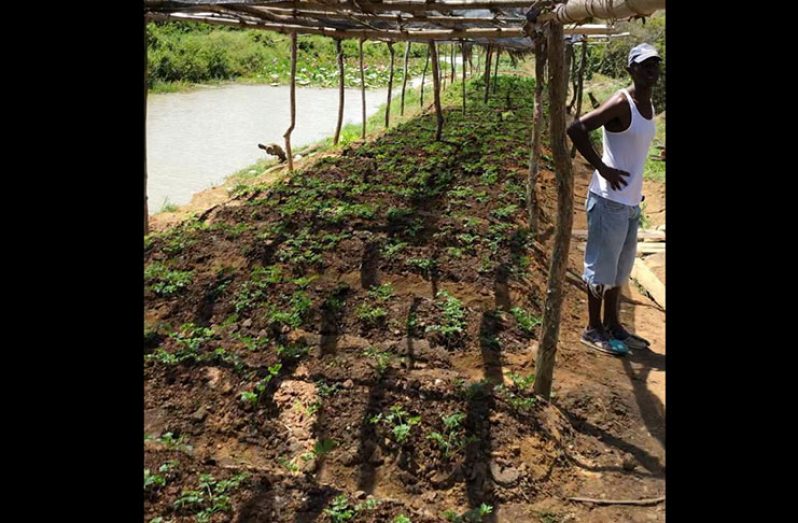As the RAID project unfolds in communities such as BV/Triumph
“THESE are men, who without the infrastructural work being put in place they were travelling the terrain, going through the hard times, dealing with the bees and the snakes and all of that, at least to keep some level of agricultural potency in this village,” said Leyland Harcourt, former chairman of the BV/Triumph NDC and a vibrant community activist in the village.
Harcourt was referring to a set of farmer-representatives who were present at an invited interview with the Pepperpot Magazine recently.
Farmers Kimbol Mentor, Leon Seales and Jermaine Jonas explained that among the produce they plant are ground provisions, green and yellow vegetables, peppers, seasonings and other items. They said that they plant not only for the satisfaction of their families, but also to sell within the village – where they ride around and sell; as well as to neighbouring villages, while even taking some of what they harvest to the Georgetown markets.
The RAID project
The Rural Agriculture Infrastructure Development (RAID) is geared to push the agricultural drive in villages such as BV/Triumph, Mocha, Buxton and Ithaca areas that were identified as farming areas in need of assistance from the RAID project.
As part of Phase one of the RAID project in the Beterverwagting area, so far many trenches have been cleared and dug; bushes cleared from the back dam lands, and infrastructural works done, which include the resuscitation of many of the main roads in the village.
Since 2015 the government started paying much attention to these areas, thus the administration has been making every effort to continue to work with these and other communities to bring them into agriculture viability of the highest level.
However, many of the communities have not been without challenges, so the Ministries of Agriculture and Finance, as well as the National Agricultural Research and Extension Institute and other agencies, continue to assist so that farmers are aptly provided with requisite planting and farming materials to be successful in their endeavours.
As part of the RAID project there will be the construction of secondary drainage and irrigation canals and hydraulic structures, rehabilitation of access dams, clearing of acres of land (depending on the village) and the establishment of pasture lands and farm plots.
The BV farmers
The farmer-representatives in the village of Beterverwagting disclosed that while they were very glad to have the necessary assistance to help push them in the endeavours that they have already established, they would like to have a more steady clearing of the trenches and the levelling of the roads at the back of the village.
“It can become very costly to keep clearing the trenches since for whatever reason the bushes grown up very quickly – as soon as it is cleared you begin to see new growth…if something could be done to help us in this regard we will be happy; maybe some kind of poison or something else that can help us because we need to use the trench to move in and out of the back dam.
“We understand that because of the infrastructure work being done the mud has to be thrown on the dam, which makes it difficult for us to use it. However, for this reason, that we need the use of the trench even more and at present we are having a hard time because of how the weeds are growing back so fast in those trenches,” said Mr. Kimbol Mentor, one of the farmers in BV.
The Government of Guyana (GoG) in 2016 signed loan and grant agreements with the Caribbean Community (CARICOM) Development Fund (CDF) for US$12.4M, which is being used for ‘neglected’ communities to boost agriculture and tackle unemployment, in addition to providing other services for the people.
The farmer representatives expressed optimism as the gained greater insight into the RAID project and its purposefulness for the people in BV and all the other communities that are been positively by it. (mercilinburke2017@gmail.com)




.jpg)










